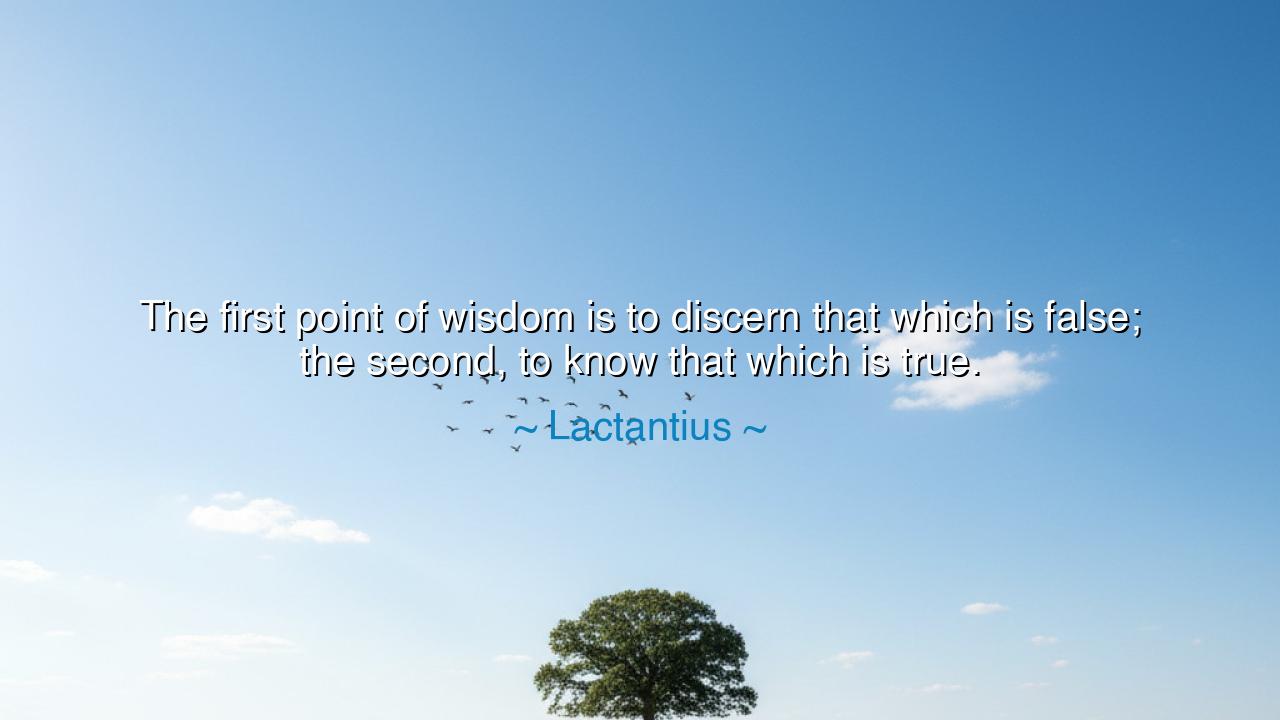
The first point of wisdom is to discern that which is false; the
The first point of wisdom is to discern that which is false; the second, to know that which is true.






“The first point of wisdom is to discern that which is false; the second, to know that which is true.” These profound words from Lactantius, an early Christian writer and philosopher, carry a truth that reverberates through the ages. The journey of wisdom is not merely one of understanding what is right or good, but one of discerning what is false and separating it from the truth. For Lactantius, as for many of the ancient philosophers, wisdom begins with the clarity to recognize illusion, deceit, and error, for only then can one arrive at the truth. This dual process of discernment and understanding lies at the very heart of philosophical inquiry and moral growth.
In the ancient world, the great philosopher Socrates emphasized the importance of questioning everything, especially that which is widely accepted as truth. In his dialectical method, Socrates sought to peel away the layers of assumptions and falsehoods that cloud human understanding. Through his questioning, he would reveal that many commonly held beliefs were rooted not in truth, but in falsehood. This relentless pursuit of truth by uncovering falsehoods was the cornerstone of Socratic wisdom, and it is the same principle that Lactantius expounds upon. Socrates taught that only through exposing falsehoods could one come to know the truth.
The life of King Solomon in the Bible provides another profound example of wisdom that seeks to discern what is false and what is true. When two women came before him, each claiming to be the mother of the same child, Solomon demonstrated this very principle. By proposing to divide the child in two, he revealed the falsehood of one woman's claim and the truth of the other. His ability to discern the false and the true allowed him to make a judgment that has become synonymous with wisdom. In this moment, Solomon embodied the first and second points of wisdom as described by Lactantius — distinguishing between falsehood and truth.
Lactantius’s words also remind us of the rise of falsehoods throughout history, particularly in the realm of politics and leadership. Consider the story of Adolf Hitler and his rise to power in Nazi Germany. Through propaganda, manipulation, and the spread of lies, Hitler cultivated a falsehood that millions were deceived by. His ability to shape reality through the distortion of truth led to the horrors of World War II. Wisdom in such a case would not only involve recognizing the falsehoods of his regime, but also understanding the truth of human dignity, morality, and justice — truths that could have prevented the devastation caused by his rise.
Thus, Lactantius's teachings are not simply theoretical; they are deeply practical, guiding us to be vigilant in the face of deceit and to remain committed to truth. In a world filled with competing ideologies, misinformation, and half-truths, the ability to discern falsehoods is more vital than ever. The pursuit of wisdom demands that we engage in the difficult work of challenging what is false, whether in our personal lives, in society, or in the broader world, so that we can anchor ourselves in the unshakeable truth.
In conclusion, let us take to heart the timeless wisdom of Lactantius: wisdom begins with discernment, and the path to truth is paved by the courage to confront falsehoods. To know what is true is a profound gift, but it comes only after the challenging work of recognizing and rejecting what is false. May we all strive to walk this path with clarity, humility, and unwavering commitment to the light of truth.






T•• Sa_ thich_quay •
I appreciate the structured approach to wisdom this quote proposes, but it also raises practical questions. How do we effectively distinguish between what is genuinely false and what is merely unfamiliar or counterintuitive? Is there a risk that in trying to identify falsehood, we might dismiss valuable alternative perspectives? It seems that learning to navigate these subtleties is essential to developing deep and meaningful wisdom.
L6Tran Thi Quynh Nhu Lop 6a4
The quote emphasizes that recognizing falsehood is the first step to understanding truth. But I wonder, what happens when our perception of truth is influenced by biases or emotions? Can we ever fully achieve the second point of wisdom if our ability to detect falsity is limited? It makes me think about the ethical responsibility of questioning what we hear and see, and how critical it is to avoid accepting claims without scrutiny.
QTQuynh Trang
This makes me wonder if wisdom is fundamentally about discernment rather than accumulation of facts. In a world flooded with misinformation and persuasive rhetoric, how can someone cultivate the skill to reliably detect falsehoods? Is discernment something innate, or can it truly be taught and refined? I also question whether knowing the truth requires ongoing vigilance, since even long-held beliefs can turn out to be incorrect over time.
BPBinh Pham
I find this perspective fascinating because it suggests a two-step approach to wisdom that seems both logical and deceptively simple. But in practice, how do we train ourselves to recognize falsehoods without becoming overly skeptical or cynical? And how do we ensure that what we accept as true is not just comforting or convenient, but genuinely valid? It raises questions about the processes we use to evaluate knowledge in our daily lives.
NQNguyen Nhu Quynh
This quote really makes me think about how challenging it is to discern truth from falsehood in today’s world. With so much information and so many conflicting narratives, what tools or habits can we develop to reliably separate what’s false from what’s true? Is wisdom more about critical thinking, intuition, or experience? I’m curious whether true understanding is possible without first actively questioning everything we encounter.